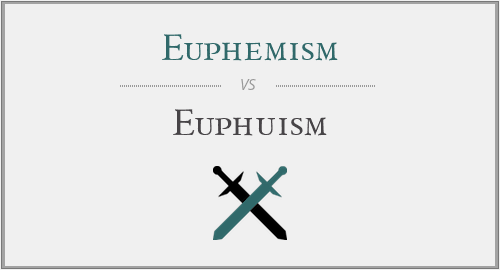Euphemism vs. Euphuism: Navigating Distinctions in Language
Understanding the differences between "euphemism" and "euphuism" involves recognizing variations in language and communication. This article aims to clarify the distinctions between "euphemism" and "euphuism," shedding light on their meanings, applications, and appropriate usage in different contexts.
Correct Usage:
Euphemism:
"Euphemism" is a noun that refers to the use of a mild or indirect expression to substitute for a harsh, blunt, or unpleasant one. It is a linguistic tool employed to soften the impact of sensitive or uncomfortable subjects. Euphemisms are commonly used in various aspects of language, including everyday conversation, literature, and formal communication.
Euphuism:
"Euphuism" is a noun that refers to an elaborate and artificial style of writing or speaking characterized by excessive use of rhetorical devices and ornate language. It is a literary style that emerged during the Elizabethan era and is associated with John Lyly's prose work "Euphues." Euphuism features exaggerated expressions, elaborate similes, and intricate wordplay.
Meanings and Applications:
Euphemism:
Use "euphemism" when describing the practice of substituting a mild or indirect expression for a harsh or unpleasant one. Euphemisms serve to make language more palatable or less offensive, especially when discussing sensitive topics.
Euphuism:
Use "euphuism" when referring to a specific literary style characterized by ornate and elaborate language. Euphuism is associated with a particular period in literature and is not a general linguistic tool like euphemism.

Examples:
Correct: Using the term "passed away" is a euphemism for "died."
Correct: The Elizabethan prose work "Euphues" is known for its distinctive euphuism.
Contextual Considerations:
Consider the purpose and style when choosing between "euphemism" and "euphuism." "Euphemism" relates to language used for sensitivity, while "euphuism" specifically pertains to an ornate literary style.
Conclusion:
Navigating the distinctions between "euphemism" and "euphuism" involves understanding their roles in language and literature. Whether softening the impact of words or exploring an elaborate literary style, using the appropriate term enhances precision and clarity in communication.




Have a discussion about this article with the community:
Report Comment
We're doing our best to make sure our content is useful, accurate and safe.
If by any chance you spot an inappropriate comment while navigating through our website please use this form to let us know, and we'll take care of it shortly.
Attachment
You need to be logged in to favorite.
Log In